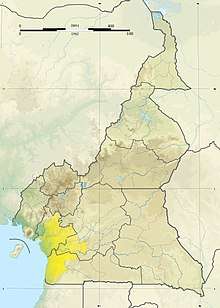Bassa people (Cameroon)
The Bassa (also spelled Basa or Basaa and sometimes known as Bassa-Bakongo) are a Bantu ethnic group in Cameroon. They number approximately 230,000 individuals. The Bassa speak the Basaa language as a mother tongue, which belongs to the Bantu branch of the Niger–Congo language family.
Bassa | |
|---|---|
| Languages | |
| Basa,Basaa | |
| Religion | |
| African religion |
History
For centuries, the Bassa lived along the Atlantic coast of what is now Cameroon. They lived off subsistence farming and fishing.[1]
The Bassa were displaced by Duala and early European traders, suffering exploitation and marginalization during the era of German Kamerun. Their fishing and farming efforts shrunk. During this German era, most Bassa were anti-colonialists, fighting against German expansion beyond the coast. However, they suffered a major defeat and were subjected to forced labor in the construction of the Douala-Yaoundé "Mittel Kamerun" railway.[1]
Throughout the era of European colonial presence, the Bassa were able to take advantage of Christian missionaries to attain a Western-style education, particularly from German Protestants and American Presbyterians.[1]

The Bassa played a lead role during decolonization, and the Bassa-Bakongo region was a hotbed of radical anti-colonial nationalism, particularly the Union des Populations du Cameroun (UPC). However, the Bassa brand of anti-colonialism ultimately lost out during the creation of the postcolonial nation of Cameroon.
Contemporary culture and politics
Despite their marginalization in the postcolonial state, there remains a belief in a "Nka kunde" or national liberation that has yet to occur.[2]
Notable individuals
Joel Embiid, basketballer
Werewere Liking, Cameroonian theatre artist, researcher and writer[3]
References
- DeLancey, Mike (2010). Historical Dictionary of the Republic of Cameroon. Scarecrow Press. p. 63.
- DeLancey, Mike (2010). Historical Dictionary of the Republic of Cameroon. Scarecrow Press. p. 64.
- Delaroche, Sophie (2016-03-24). "Werewere Liking". World Encyclopedia of Puppetry Arts. Retrieved 2019-08-03.
Hyman, Larry M. (2003). "Basaá (A.43)". In Nurse, Derek; Philippson, Gérard (eds.). The Bantu Languages. Routledge. pp. 257–282. ISBN 0-7007-1134-1.